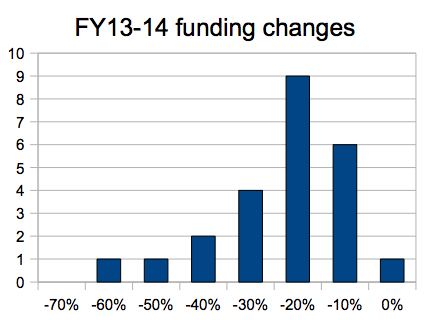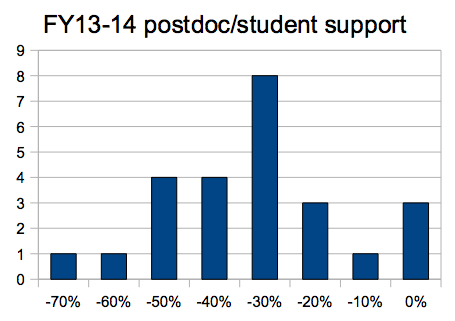Marching for Science
The March for Science, happening tomorrow 22 April in Washington DC and in satellite events around the globe (including here in LA), is on the one hand an obviously good idea, and at the same time quite controversial. As in many controversies, both sides have their good points!
Marching for science is a good idea because 1) science is good, 2) science is in some ways threatened, and 3) marching to show support might in some way ameliorate that threat. Admittedly, as with all rallies of support, there is a heavily emotive factor at work — even if it had no effect whatsoever, many people are motivated to march in favor of ideas they believe in, just because it feels good to show support for things you feel strongly about. Nothing wrong with that at all.
But in a democracy, marching in favor of things is a little more meaningful than that. Even if it doesn’t directly cause politicians to change their minds (“Wait, people actually like science? I’ll have to revise my stance on a few key pieces of upcoming legislation…”), it gets ideas into the general conversation, which can lead to benefits down the road. Support for science is easy to take for granted — we live in a society where even the most anti-science forces try to portray their positions as being compatible with a scientific outlook of some sort, even if it takes doing a few evidentiary backflips to paper over the obvious inconsistencies. But just because the majority of people claim to be in favor of science, that doesn’t mean they will actually listen to what science has to say, much less vote to spend real money supporting it. Reminding them how much the general public is pro-science is an important task.

Not everyone sees it that way. Scientists, bless their hearts, like to fret and argue about things, as I note in this short essay at The Atlantic. (That piece basically what I’ll be saying when I give my talk tomorrow noonish at the LA march — so if you can’t make it, you can get the gist at the link. If you will be marching in LA — spoiler alert.) A favorite source of fretting and worrying is “getting science mixed up with politics.” We scientists, the idea goes, are seekers of eternal truths — or at least we should aim to be — and that lofty pursuit is incompatible with mucking around in tawdry political battles. Or more pragmatically, there is a worry that if science is seen to be overly political, then one political party will react by aligning itself explicitly against science, and that won’t be good for anyone. (Ironically, this latter argument is an attempt at being strategic and political, rather than a seeker of universal truths.)
I don’t agree, as should be clear. First, science is political, like it or not. That’s because science is done by human beings, and just about everything human beings do is political. Science isn’t partisan — it doesn’t function for the benefit of one party over the other. But if we look up “political” in the dictionary, we get something like “of or relating to the affairs of government,” or more broadly “related to decisions applying to all members of a group.” It’s hard to question that science is inextricably intertwined with this notion of politics. The output of science, which purports to be true knowledge of the world, is apolitical. But we obtain that output by actually doing science, which involves hard questions about what questions to ask, what research to fund, and what to do with the findings of that research. There is no way to pretend that politics has nothing to do with the actual practice of science. Great scientists, from Einstein on down, have historically been more than willing to become involved in political disputes when the stakes were sufficiently high.
It would certainly be bad if scientists tarnished their reputations as unbiased researchers by explicitly aligning “science” with any individual political party. And we can’t ignore the fact that various high-profile examples of denying scientific reality — Darwinian evolution comes to mind, or more recently the fact that human activity is dramatically affecting the Earth’s climate — are, in our current climate, largely associated with one political party more than the other one. But people of all political persuasions will occasionally find scientific truths to be a bit inconvenient. And more importantly, we can march in favor of science without having to point out that one party is working much harder than the other one to undermine it. That’s a separate kind of march.
It reminds me of this year’s Super Bowl ads. Though largely set in motion before the election ever occurred, several of the ads were labeled as “anti-Trump” after the fact. But they weren’t explicitly political; they were simply stating messages that would, in better days, have been considered anodyne and unobjectionable, like “people of all creeds and ethnicities should come together in harmony.” If you can’t help but perceive a message like that as a veiled attack on your political philosophy, maybe your political philosophy needs a bit of updating.
Likewise for science. This particular March was, without question, created in part because people were shocked into fear by the prospect of power being concentrated in the hands of a political party that seems to happily reject scientific findings that it deems inconvenient. But it grew into something bigger and better: a way to rally in support of science, full stop.
That’s something everyone should be able to get behind. It’s a mistake to think that the best way to support science is to stay out of politics. Politics is there, whether we like it or not. (And if we don’t like it, we should at least respect it — as unappetizing as the process of politics may be at times, it’s a necessary part of how we make decisions in a representative democracy, and should be honored as such.) The question isn’t “should scientists play with politics, or rise above it?” The question is “should we exert our political will in favor of science, or just let other people make the decisions and hope for the best?”
Democracy can be difficult, exhausting, and heartbreaking. It’s a messy, chaotic process, a far cry from the beautiful regularities of the natural world that science works to uncover. But participating in democracy as actively as we can is one of the most straightforward ways available to us to make the world a better place. And there aren’t many causes more worth rallying behind than that of science itself.
Marching for Science Read More »




 Of all the concepts for big astrophysics missions in space, LISA is my favorite. Unlike
Of all the concepts for big astrophysics missions in space, LISA is my favorite. Unlike